Botchan by Natsume Soseki
What would you do, when you see a teacher often lying and cheating his own coworkers, using them for personal gain, when they often teach their students and tell them to always be honest? If so, what else is there in school there is education about morals and ethics?
That would be the issue raised in Botchan, a fine novel by Natsume Sōseki (1867-1916). Botchan itself is the name of the main character. Botchan, in Indonesian more or less means a kind of "young master". According to the story, this title is pinned by a housekeeper who is very loyal to take care of Botchan, named Kiyo. Botchan is a boy who badungnya ask for mercy. His mother and father died when he was a child. With the money left over, he was able to continue his studies and college, eventually becoming a teacher in a small town far enough away from Tokyo where he lived.
Well, how do you imagine a boy who once was so nasty, being a teacher? No doubt, Botchan turns out to be his student's whistle. Almost at every opportunity, the students made Botchan a joke. At its peak, they put a flock of locusts in Botchan's bed while he was at night in the dormitory. Botchan furious.
The real problem, however, was not with the mischievous students, but to Botchan's colleagues at school, the other teachers. Described as a figure who often observes and judges, Botchan gives them a nickname based on what is most striking in themselves. Headmaster, aka "The Badger"; vice principal, Akashatsu, aka "Red-shirt"; Nodaiko, aka "The Clown"; Uranari, aka "The Green Squash"; and Yamaarashi, aka "Mr. Porcupine ". Spending day after day teaching at school in a traditional city, Matsuyama, Botchan slowly learned that there was someone who deliberately did something unpleasant about him. At first he was angry with the naughty disciples who often worked on him, but lately he knew that there was a mastermind behind all the problems that befell him. The master is his own co-worker, the deputy principal, Red-shirt.
Red-shirts, acting as a teacher who has manners and a word of sweetness, has deceived Botchan outright. He is a two-faced man. Botchan is so innocent and sometimes naive. More precisely: Botchan is a straightforward figure and has respect for anyone who does good to him. Honor and honest attitude are all things that guide his life. Thus, he demands others to be the same, honest and straightforward. Botchan thought school should be the place to teach those things. The firmness to crack down on the wrong and punish the worth in every unpleasant act. However, the Red-shirt says something else: "As if advising Botchan, the Red-shirt goes on:" To be doing right is, of course, good as you say, but that alone will save you from the snares people set at you, if you know how bad they are. You must know there are people who look very cheerful and open hearted, who will so kindly see your board and longing, and you will have to be watchful. "
On the way, Botchan became more and more convinced of the true face of his fellow teachers at school. Red-shirts full of sweet and polite words turned out to be a con man and fond of setting him up in a troublesome condition. Porcupine, who was originally considered Botchan on the opposite camp, became the only partner in crime he could rely on. Botchan was so innocent, not to call him naive, so he was so shocked and surprised to see the people at the school who turned out to be different from the impression he first caught. "These things made me think nothing on earth was reliable," he complained.
At first I thought the Botchan mischief depicted in the first chapter of the novel would be an important thing when he grew up, it did not. After 24 years of age and becoming a teacher, Botchan is an honest, straightforward, even mature, deeply, occasionally philosophical, and strongly principled figure. This is how Botchan said when he was upset after being taunted by his students: "No crime could be canceled before a man apologized, confessing what he had done was wrong. His conscience would tell him he had done wrong. A right-minded man would go to bed and repent from the bottom of his heart and come to ask forgiveness. "
Many times I chuckle at the narrow and sometimes hilarious narration. As for example when Botchan responded very seriously to the unpleasant acts committed by his students: "My ancestors were bodyguards to the Shōgun; they all belonged to a very ancient stock of the Minamoto, a direct line of the Emperor Seiwa, that is to say, I am a descendent of the proud knight, Tada Mitsunaka. I am of noble birth-incomparably higher than those poor lowly peasant lads. "
Like most Japanese literary works (except Murakami), Botchan has a fairly slow groove. Fortunately, not too slow. I bet you'll fall asleep on page 50 of the Snow Country novel - Yasunari Kawabata. But not with Botchan. The sarcasm and humorous narration made me feel good and feel at home reading the pages after Botchan. One thing that I find quite strange is, there is no description of the beautiful nan syahdu (usually natural atmosphere) typical of Japan in Botchan. Makes Botchan felt, on the one hand, "not very Japanese". Although in other parts still feels Japanese cultural custom appears on Botchan scenes. There are only a few "typical Japanese" descriptions, as in the following example:
I continued to read patiently, when a wind of early fall sprang up; shook the broad leaves of banana plants in the garden.
Perhaps because it was written in 1906, the language of Natsume Sōseki in Botchan uses a kind of "old school" language. The structure of the sentence is like if you read the Shakespeare drama texts. I can not imagine how the Botchan manuscript is in its original Japanese. Reading the English version only (Umeji Sasaki translation) I can see how "old" the language is Natsume Sōseki. However, I can say that Botchan's story remains understandable, by understanding the context of every scene and not overly confusing the word sense.
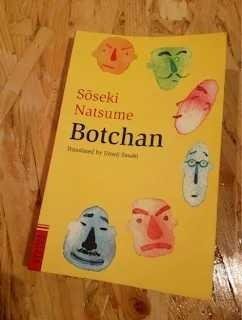
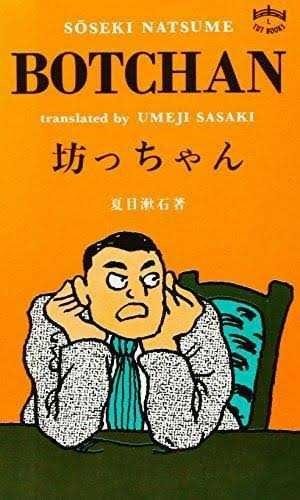
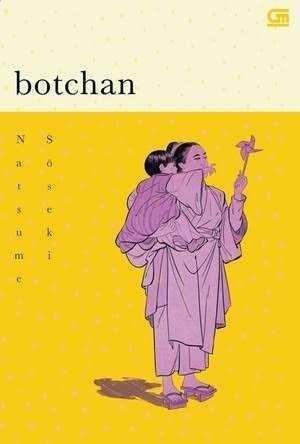
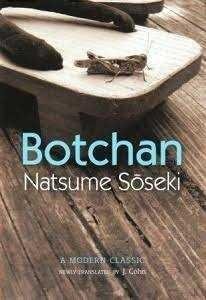
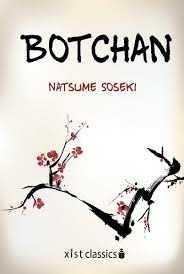
Congratulations @dinda-safira! You have completed some achievement on Steemit and have been rewarded with new badge(s) :
Click on any badge to view your own Board of Honor on SteemitBoard.
For more information about SteemitBoard, click here
If you no longer want to receive notifications, reply to this comment with the word
STOPCongratulations @dinda-safira! You have completed some achievement on Steemit and have been rewarded with new badge(s) :
Click on any badge to view your Board of Honor.
For more information about SteemitBoard, click here
If you no longer want to receive notifications, reply to this comment with the word
STOPDo not miss the last announcement from @steemitboard!
Congratulations @dinda-safira! You have completed some achievement on Steemit and have been rewarded with new badge(s) :
Click on the badge to view your Board of Honor.
If you no longer want to receive notifications, reply to this comment with the word
STOPCongratulations @dinda-safira! You have completed some achievement on Steemit and have been rewarded with new badge(s) :
Click on the badge to view your Board of Honor.
If you no longer want to receive notifications, reply to this comment with the word
STOPCongratulations @dinda-safira! You have completed some achievement on Steemit and have been rewarded with new badge(s) :
Click on the badge to view your Board of Honor.
If you no longer want to receive notifications, reply to this comment with the word
STOPDo not miss the last announcement from @steemitboard!
Congratulations @dinda-safira! You received a personal award!
Click here to view your Board
Congratulations @dinda-safira! You received a personal award!
You can view your badges on your Steem Board and compare to others on the Steem Ranking
Vote for @Steemitboard as a witness to get one more award and increased upvotes!